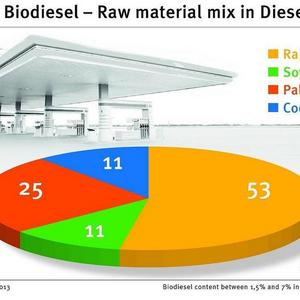UFOP samples 60 stations, finds biodiesel feedstock diversity up

July 12, 2013
BY UFOP
With 53 percent raw material content, rapeseed oil remains the most important raw material source for the production of biodiesel in Germany, followed by palm oil with 25 percent, and coconut and soy oil at 11 percent each. This is the result of the study presented by the Union zur Förderung von Oel- und Proteinpflanzen e.V. (UFOP). Sixty filling stations of mineral oil companies throughout Germany—weighted according to market shares—were sampled and the biodiesel component in the diesel fuel, as well as its raw material composition, were determined on behalf of the UFOP.
In 2010 and 2011, German agriculture benefitted from the fact that practically only certified rapeseed from domestic production was available after the immediate national implementation of the Renewable Energies Directive. The raw material mix now determined reveals that the certification systems approved by the EU Commission have now also been introduced in countries outside the EU such as Argentina, Brazil as well as Indonesia and Malaysia. In other words, the supply of sustainably certified raw materials for biofuel production has meanwhile become globalized, according to UFOP.
Advertisement
It is a stipulation of the international laws that market access may not be denied if the specified ground rules are complied with. Nevertheless, the UFOP has serious misgivings and believes that closer attention must be paid in respect to the quality of the national implementation and the certification introduced in the sense of fair competition, but also nature and environmental protection locally. The RED makes it possible to examine the quality of the sustainability certification. In contrast to all other utilization options for biomass in the food or chemical industry, a statutory basis for sanctions exists here. Market access to the EU can be denied or the apportioning of imported biofuel quantities from countries outside the EU to the quota obligation can be rejected if the documentation as a prerequisite for compiling sustainability validations does not correspond to the requirements of the certification systems.
As this involves so-called voluntary systems, the UFOP urges the EU Commission to set out strict rules for the quality of the implementation and monitoring by the certification body as well as the responsible authorities of the member states. Thus, for example, a certificate of origin for the biofuels, beginning with the cultivation region, is possible without any problem thanks to modern satellite technology.
Advertisement
Instead of calling into question the prospects of the European biofuel industry and hence retention of the certification systems with sometimes impractical proposals, the EU Commission and the members of the European parliament should recognize the pioneering role of biofuels and push forward the further development of certification systems for avoiding bypassing measures. The UFOP is convinced that sustainability certification systems will be superfluous in future, if the first generation of biofuels is superseded as an element in a European strategy for climate and resource protection.
The study is available for downloading at www.ufop.de.
Related Stories
In a rapidly evolving energy landscape, the 41st International Fuel Ethanol Workshop & Expo will return June 9–11 to the CHI Health Center in Omaha, Nebraska. The event is recognized as the largest and longest-running ethanol conference in the world.
The U.S. EPA on April 11 reported that 1.82 billion RINs were generated under the RFS in March, down from 1.93 billion generated during the same month of 2024. Approximately 5.34 billion RINs were generated during the first quarter of 2025.
The U.S. EPA on April 17 published updated SRE data showing that five new SRE petitions have been filed under the RFS during the past month. According to the agency, 161 SRE petitions are currently pending,
CoBank latest quarterly research report highlights current challenges facing the biobased diesel industry. The report cites policy uncertainty and trade disruptions due to tariff disputes as factors impacting biofuel producers.
The U.S. EIA on April 15 released its Annual Energy Outlook 2025, which includes energy trend projections through 2050. The U.S. DOE, however, is cautioning that the forecasts do not reflect the Trump administration’s energy policy changes.
Upcoming Events










